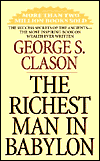 The
Richest Man in Babylon
The
Richest Man in Babylon , by George S. Clason, 160 pp.. (Also
available in Audio)
, by George S. Clason, 160 pp.. (Also
available in Audio)
Originally written in the
1920's, this beloved classic has sold millions and just keeps on
selling. What's the appeal? The delightful story format, set in ancient
Babylon, makes otherwise dry financial concepts come to life.
Bansir has
distinguished himself as a fine chariot-maker. Yet, he has no money. He
decides to seek the wisdom of his old friend Arkad, who's known far
and wide for his great wealth. As youth, they were financial
equals. Bansir assumed that fortune had simply looked more favorably
upon Arkad. Arkad replies,
"If you have not
acquired more than a bare existence in the years since we were youths,
it is because you either have failed to learn the laws that govern the
building of wealth, or else you do not observe them." (p. 10)
Thus, Arkad shares "the
laws that govern the building of wealth" in the story of his own
rise to riches.
The
premise: "Lo, money is plentiful for those who
understand the simple rules of its acquisition." (p. iii)
The
Wisdom:
1. Seek the advice of
the wise
"Counsel with wise men.
Seek the advice of men whose daily work is handling money." (p.
20)
"Seek to associate
thyself with men and enterprises whose success is established that
thy treasure may earn liberally under their skillful use and be
guarded safely by their wisdom and experience." (p. 85)
2. Start thy purse to
fattening
"I found the road to
wealth when I decided that...a part of all I earned was mine to
keep.... It should be not less than a tenth no matter how little you
earn.... Pay yourself first." (pp. 13,14)
3. Control thy
expenditures
"Now I will tell thee an
unusual truth about men and sons of men. It is this: That what each
of us calls our 'necessary expenses' will always grow to equal our
incomes unless we protest to the contrary." (p. 29)
4. Make thy gold
multiply
"Every gold piece you
save is a slave to work for you. Every copper it earns is its child
that also can earn for you. If you would become wealthy, then what
you save must earn, and its children must earn, that all may help to
give to you the abundance you crave." (p. 14)
5. Guard thy treasures
from loss
"...behind the
impregnable walls of insurance, savings accounts and dependable
investments, we can guard ourselves against the unexpected tragedies
that may enter any door and seat themselves before any
fireside." (p. 90)
6. Make of thy dwelling
a profitable investment
"I recommend that every man
own the roof that sheltereth him and his."
7. Insure a future
income
"...invest thy treasure
with greatest caution that it be not lost. Usurious rates of return
are deceitful sirens that sing but to lure the unwary upon the rocks
of loss and remorse." (p. 20)
8. Increase thy ability
to earn
"Opportunity is a haughty
goddess who wastes no time with those who are unprepared." (p.
18)
"...cultivate thy own
powers, to study and become wiser, to become more skillful, to so
act as to respect thyself." (p. 41)
"...I urge all men to be
in the front rank of progress and not to stand still, lest they be
left behind." (p. 41)
9.
Beware of unwise debt
"...hopeless debt is like
a deep pit into which one may descend quickly and where one may
struggle vainly for many days. It is a pit of sorrow and regrets
where the brightness of the sun is overcast and night is made
unhappy by restless sleeping." (p. 80)
10.
Help the less fortunate
"...have compassion upon
those who are injured and smitten by misfortune and aid them within
reasonable limits. He must do deeds of thoughtfulness to those dear to
him." (p. 41)
"Nothing revolutionary
here," you might complain. True, it's just ageless principles of
finance. But how many of us can put these principles into life? Arkad
did. By reading this book, we see how he applied these principles in ancient
Babylon. Somehow, seeing the principles of wise money management applied
in a long lost culture , we see more clearly how to build wealth in our
own culture.
Click
for More Money Book Summaries
The Richest Man in
Babylon Book
Summary

